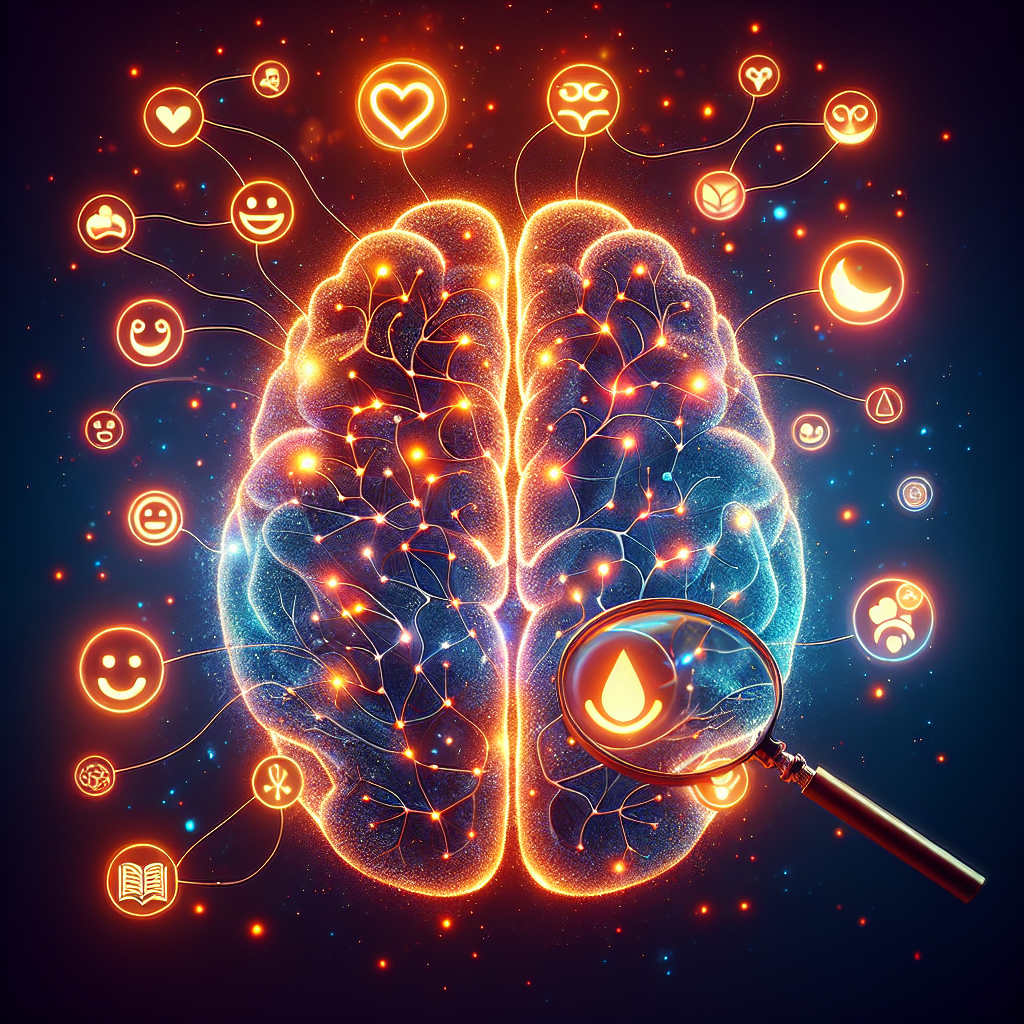-
Table of Contents
Introduction

Emotional Intelligence (EI), also known as Emotional Quotient (EQ), refers to the ability to perceive, control, and evaluate emotions. First popularized by Daniel Goleman in the 1990s, EI involves a set of skills that help individuals recognize and manage their own emotions, as well as the emotions of others. These skills include self-awareness, self-regulation, motivation, empathy, and social skills. Emotional intelligence is crucial because it influences how well people interact with others, manage conflict, and make personal decisions that achieve positive results. An increasing body of research suggests that high emotional intelligence is linked to better performance in various life domains, including leadership, teamwork, and mental health.
Feeling Stressed or Recognize These Signs?
Talk to a Therapist NowStrategies For Enhancing Emotional Intelligence In The Workplace
Emotional intelligence, often abbreviated as EI, refers to the ability to perceive, control, and evaluate emotions. In the modern workplace, where teamwork and client relations are paramount, emotional intelligence has emerged as a critical skill set, influencing leadership, collaboration, and overall workplace atmosphere. Enhancing emotional intelligence within a corporate setting not only fosters respectful communication and conflict resolution but also enhances everyone’s overall job satisfaction and performance.
One effective strategy for improving emotional intelligence is the cultivation of self-awareness. This involves individuals taking the time to reflect on their own emotions and the impact of their actions on others. Regular self-reflection enables employees to identify their emotional strengths and weaknesses and understand how their emotional responses can affect their decision-making and interpersonal relationships. Tools such as journals or feedback mechanisms can be instrumental in fostering this self-awareness.
Another pivotal aspect of enhancing emotional intelligence is the development of empathy, which is the ability to understand and share the feelings of another. In a workplace, this can be encouraged through active listening exercises where employees are trained to listen attentively to their colleagues without immediately responding or judging. This practice not only aids in building mutual respect among team members but also helps in understanding diverse perspectives, which is crucial in a multicultural work environment.
Moreover, emotional regulation is another key area that can be developed to boost emotional intelligence. This involves learning how to manage and respond to one’s emotions appropriately. Training sessions that focus on stress management techniques such as deep breathing exercises, mindfulness meditation, or even time management can help individuals gain better control over their emotions. By managing stress effectively, employees can maintain a calm demeanor even in high-pressure situations, leading to more productive and harmonious workplace interactions.
Communication skills also play a significant role in enhancing emotional intelligence. Clear and effective communication can prevent misunderstandings and conflicts among team members. Workshops that emphasize empathetic communication and teach how to express thoughts and feelings clearly can be extremely beneficial. These workshops can include role-playing scenarios that provide employees with the opportunity to practice and refine their communication skills in a controlled, supportive environment.
Finally, fostering an organizational culture that values and promotes emotional intelligence is crucial. Leadership plays a significant role in this by setting an example. Leaders who demonstrate high levels of emotional intelligence, such as showing genuine concern for employees’ well-being, acknowledging their own mistakes, and communicating openly, can inspire their teams to follow suit. Additionally, incorporating emotional intelligence into performance reviews and providing incentives for improvement can further embed these values into the corporate culture.
In conclusion, enhancing emotional intelligence in the workplace is a multifaceted process that requires commitment and continuous effort from both individuals and the organization as a whole. By focusing on developing self-awareness, empathy, emotional regulation, and communication skills, and by fostering a supportive organizational culture, businesses can create a more empathetic and efficient workplace. This not only improves individual and team performance but also contributes to a more positive and productive work environment.
The Role Of Emotional Intelligence In Effective Leadership
Emotional intelligence, often abbreviated as EI, refers to the ability to perceive, control, and evaluate emotions. In the realm of leadership, emotional intelligence is a pivotal asset, playing a crucial role in shaping effective leaders. This article explores how emotional intelligence influences leadership effectiveness, fostering environments that promote productivity and harmony.
Leaders with high emotional intelligence are adept at recognizing their own emotions and the emotions of others. This awareness is fundamental in the workplace as it influences decision-making, communication, and conflict resolution. By understanding what they feel, leaders can manage their responses to prevent emotions from clouding their judgment. This self-awareness extends to recognizing emotional cues from team members, which can be critical in understanding team dynamics and motivations.
Transitioning from self-awareness, another aspect of emotional intelligence is self-regulation. Leaders who excel in self-regulation are able to control their emotions and impulses, which is vital in maintaining a professional demeanor and making impartial decisions. For instance, in high-pressure situations, a leader with strong self-regulation can remain calm and collected, providing a sense of stability for the entire team. This ability not only helps in managing their own stress but also in mitigating the spread of anxiety or panic among team members.
Moreover, emotional intelligence facilitates empathy, a quality that is indispensable for effective leadership. Empathetic leaders are capable of putting themselves in others’ shoes, which enhances their ability to understand and meet the needs of their employees. This understanding can lead to more personalized interactions, which are crucial for motivating employees and fostering loyalty. Empathy in leadership helps in building and maintaining strong relationships, which are essential for collaborative work environments.
Another significant aspect of emotional intelligence in leadership is social skills. Leaders with high EI are often excellent communicators; they know how to convey their messages clearly and listen to feedback. Effective communication helps in aligning the team towards common goals and avoiding misunderstandings that can lead to conflict. Additionally, these leaders are adept at building and managing teams. They use their emotional intelligence to resolve disputes and to promote a cooperative team environment, which is crucial for achieving any collective task.
The impact of emotional intelligence on leadership effectiveness also extends to motivational capabilities. Leaders with high emotional intelligence are better equipped to judge what motivates their team members. This capability allows them to inspire and push the team towards achieving more, often exceeding expectations. By acknowledging and appreciating the efforts of their team, emotionally intelligent leaders enhance individual and group morale, which is directly linked to increased productivity and satisfaction.
In conclusion, emotional intelligence is a cornerstone of effective leadership. It enhances a leader’s ability to understand, empathize, and interact effectively with others. In today’s diverse and fast-paced business environment, emotional intelligence is not just a useful tool, but a fundamental necessity. Leaders who cultivate these emotional skills are better equipped to handle the demands of leadership, drive their teams towards success, and create a workplace culture that is conducive to growth and development. As such, the development of emotional intelligence in leaders should be seen as a priority for organizations aiming to thrive in the modern business landscape.
Emotional Intelligence And Mental Health: Understanding The Connection
Emotional Intelligence, often abbreviated as EI or EQ (Emotional Quotient), refers to the ability to perceive, control, and evaluate emotions. This skill extends beyond simple recognition of our own emotions and those of others; it involves a sophisticated understanding of the emotional landscape, including the ability to navigate through it effectively. The connection between emotional intelligence and mental health is profound and multifaceted, influencing how we manage stress, interact with others, and make personal decisions.
At its core, emotional intelligence comprises several key abilities: self-awareness, self-regulation, motivation, empathy, and social skills. Each of these components plays a critical role in shaping our mental health. For instance, self-awareness allows individuals to recognize their emotional state, which is crucial in identifying what they feel and why they feel it. This recognition is the first step in managing emotions effectively, rather than being controlled by them.
Transitioning from self-awareness, self-regulation involves managing one’s emotions appropriately. People with high EQ are typically better equipped to handle impulses and modulate their emotions in response to their environment, which can lead to more positive outcomes in both personal and professional contexts. This ability to adjust emotions tactfully can reduce the psychological stress that often accompanies unmanaged emotional responses.
Moreover, emotional intelligence directly impacts our motivation, driving how we meet challenges and persevere in the face of adversity. A well-regulated emotional state can foster an optimistic outlook, enhancing the ability to pursue goals with energy and persistence. This aspect of EQ is particularly beneficial for mental health, as it contributes to resilience, reducing the risk of depression and anxiety.
Empathy, another facet of emotional intelligence, is the capacity to understand and share the feelings of another. This skill is vital for effective interpersonal interactions and relationships. Empathy not only helps in nurturing social connections but also aids in conflict resolution and management. By understanding others’ emotional states, individuals can respond more appropriately and sensitively, which promotes better mental health outcomes for everyone involved.
Finally, emotional intelligence enhances social skills such as communication, conflict management, and the ability to build and maintain relationships. These skills are indispensable in daily life and work settings, where social interaction plays a pivotal role. Effective social skills can lead to a more supportive social network, providing individuals with resources to lean on during times of stress or emotional turmoil.
The interplay between emotional intelligence and mental health is evident in how individuals with high EQ tend to have lower levels of stress and anxiety. They are better at managing stressors, often viewing challenging situations as opportunities rather than threats. Furthermore, their ability to navigate complex social landscapes can lead to more fulfilling and less conflict-ridden relationships. All these factors contribute to a healthier, more stable mental state.
In conclusion, enhancing one’s emotional intelligence can be a powerful tool for improving mental health. It not only helps in managing one’s own emotions but also improves interactions with others, ultimately leading to a more balanced and fulfilling life. As research continues to uncover more about this vital aspect of human psychology, it becomes increasingly clear that fostering emotional intelligence can significantly benefit both individuals and communities, promoting better mental health and well-being across the board.
Conclusion
Emotional intelligence (EI) is crucial for personal and professional success. It involves the ability to recognize, understand, manage, and reason with emotions effectively in oneself and others. High EI contributes to better relationships, leadership abilities, and mental health. It enhances decision-making and problem-solving skills and is a predictor of job performance and general well-being. Developing EI can lead to more empathetic interactions and a more fulfilling life.

